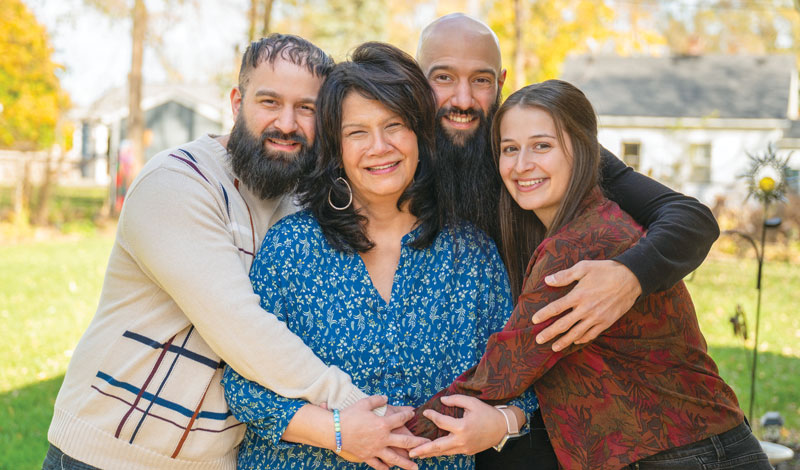Living Buddhism: Robin, Robert, thank you for sharing your experience with us. Where does your story begin?
Robin Benvenuti: It started with a request for a book. “Something good,” was all he asked. It had been years since he’d reached out asking after books, and never for a recommendation. Our deal, dating back to his middle school days was, “Any book you want.” I’d come up with the idea to keep Robbie out of trouble, and in the hopes that he’d learn from books what he avoided learning from me.
“I’m not you,” he told me frankly. “You are who you are because of what you experienced firsthand. It’ll be the same for me.”
I remember feeling equal parts impressed and exasperated. As far as stories were concerned, he gravitated to true crime. Not the most stabilizing genre for a teenager in the early stages of shaping his future. Fiercely independent, quite hardheaded at times, he was, in fact, more like me than he knew, and more than I cared to admit.
It would be years before he began to seriously think about what kind of story he wanted to write for himself.
Robert Benvenuti: In 2017, a friend and I were renting a home with monthly cash payments to the owner. Months into this arrangement, we discovered that the house was in fact part of the city’s landbank and slated, along with every home on the block, for demolition. The person we’d thought had owned the property did not, and we as the renters, had been effectively squatting. Discovering this, I moved in with my dad.
Why not go home to your mom’s?
Robin: If it’s all right, I can answer that one. “You’ll bring a sense of uneasiness back into my home,” I told him. Before he’d moved out, he’d developed a tumultuous relationship with his younger sister that brought an anxious tension to the home environment.
Though disappointed with my answer, I believe he understood it. He went to live with his father, with whom he was often in disagreement.
Robert: For all our differences, things did begin to slow down when I got to my dad’s. We had our arguments, but he was often at work, leaving me with lots of time between to think.
I was unemployed, and jobs were not easy to find. I eventually found a job nearby, worked part-time and eventually gained a full-time position. This meant I was able to obtain health insurance, which I hadn’t had for a long time. Little by little, I started paying off my debt.
It was the most difficult time of my life. I wanted to change, but I didn’t know how. My mom was my lifeline. I relied on her for emotional support, to keep my sanity. She was always calm and supportive. Then during the pandemic in 2020, she sent me a book.
Robin: A book I hoped would speak to his love of history. It follows the marriage of a Japanese woman and an American serviceman—an up-close look at the consequences of war and the obstacles that were faced by such couples in its aftermath. And I sent it because it resonates with the history of our own family.
My parents, Robbie’s grandma and grandpa, married after the war. My mother was Japanese, my father an American serviceman stationed in Tokyo. Many of her friends and family were indignant, even furious, that she’d marry a man whose country had leveled her own. For my mother, though, the most important thing was that this man was strong, kind and committed heart and soul to kosen-rufu. Raised in Bunkyo, she and her mother practiced alongside Ikeda Sensei when he was the Bunkyo Chapter chief.
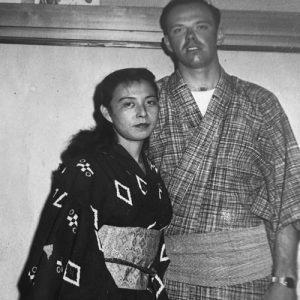
My father passed away in 2017, six years after my mother. Before he died, he called the grandkids around his bed, handing each a set of juzu beads and asking that they never forget their faith. At the time, none of the grandkids were actively practicing Buddhism. Aware of this, he took me aside and asked me: “Please raise the next generation.”
Well, this “next generation” felt positively about Buddhism but considered it their mother’s practice. Of course, I could not make it otherwise—it was up to them whether they practiced or not. But my father’s request—really his last of me—shifted my prayer to the Gohonzon.
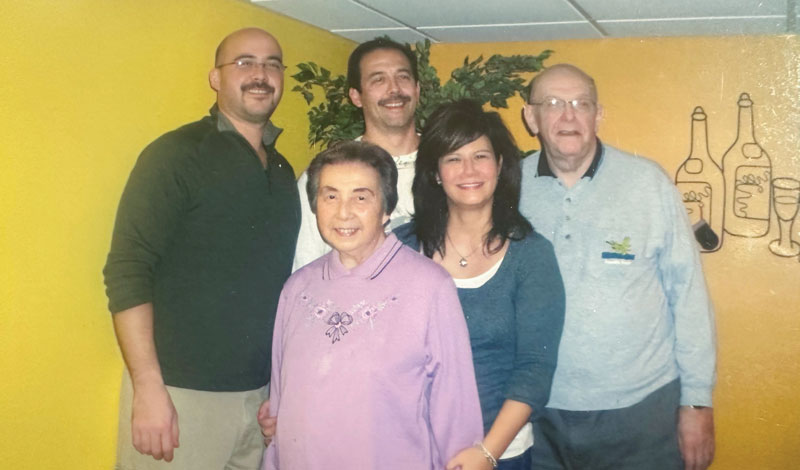
Shifted how?
Robin: I’ve always chanted for the happiness of my children. And I’d always known that actions, not words, are what move people. I began to chant more earnestly than ever, to show proof of the power of the practice with my own life.
I made a determination to the Gohonzon to awaken, through my own example, my children to the greatness of their lives. I listed out their names and began to chant. I must say, looking back, I was clearly still relying on my head, on my own reasoning and strategy, because I listed them out in the order I thought them most likely to stand up in faith. I know Robbie has no qualms with me saying here that his name was at the bottom. I didn’t do this purposefully, or even consciously—it was only that I couldn’t imagine him deciding to take up faith.
What did he think of the book you sent him?
Robin: It moved him. It broke his heart—or rather, melted his heart. I don’t think he’d ever thought much about his personal relationship with Buddhism. I think it made him think about the conditions under which it arrived and took root in America, in the wake of war. My son has never been one to bow out of an argument. If he sees a cow (large, hooved, mooing thing with white fur and black spots), he’ll call it a cow. Should someone come along and ask him what he thinks of that there dog, he’ll go to great lengths to correct them. He’ll insist, to the detriment of his own sanity, that that there is no dog but a cow if there ever was one, a textbook example, and he’ll stand there until the sun’s set and there’s no light to see by and nothing left—dog or cow—to insist on. Admirable, in a way, but unproductive. The other person gets defensive, digging in their heels and Robbie gets evermore baffled. But upon reading this book, it seems to me he began to consider his grandparents’ response to war, the most extreme kind of conflict—a response that stressed building a future together, one in which all people were recognized in each other’s eyes for the inherent, unlimited dignity they possess.
In any case, as soon as he’d finished that book, he reached out for another. He wanted to know if I had anything Ikeda Sensei had written with America specifically in mind. I looked over at my bookshelf, a collection decades in the making, which had doubled at my father’s passing. I looked at the six copies of My Dear Friends in America. “Yeah,” I said, “I’ve got something for you.”
And you? What was going on in your life at the time?
Robin: While Robbie was working his way through My Dear Friends in America, I was presented with an opportunity to demonstrate the kind of response to conflict that had so impressed my son. In 2022, there were some changes at work, and I found myself working with someone who seemed to strongly dislike me. The resulting anxiety was so intense that, for days on end, I got home from work and threw up. In later 2022, I was let go from the place I’d worked for 25 years where I’d earned a great reputation. As much as the layoff stunned me, I was even more shocked by the meager severance offered. I kept my cool, prepared to fight the injustice before me and took everything to the Gohonzon, not breaking stride for a moment. If anything, I doubled down on SGI activities, on contribution, on visiting and encouraging the members of my chapter. All three of my kids were fuming on my behalf, asking me in turn why I wasn’t enraged, why I seemed so calm. In fact, I only looked calm—like a duck gliding serenely on the surface of a lake, I was paddling furiously beneath the water.
Robbie?
Robbie: I started reading My Dear Friends in America at the end of 2020. A page-turner, for sure, but not like any I’d ever come across before, not in the conventional sense. I was making my way slowly, not quickly—turning pages backward as well as forward, reading and then re-reading and then, if I wasn’t certain that I’d fully understood, reaching out to talk it over with my mom. It dawned on me that all my life, despite it being always in arms’ reach, I’d never truly understood either Buddhism or Sensei. Frankly, growing up, I’d worried my mom was wasting her time at all those SGI meetings. It was only then, on the bridge of turning 30, unhappy with how my life was going, that I began to ask myself whether I might have been missing something all along.
Robin: I got a brief call from Robbie in September 2022, in which he relayed a short, anxiety-inducing message: “I have something to tell you. In person, not over the phone.” We set a time to get together in a few days, during which I went over in my mind every kind of trouble he might’ve gotten himself into—money trouble, girl trouble, trouble with the law.
“Alright, what is it?” I blurted when he came over at last.
“I’ve been chanting,” he said, “morning and evening the last two weeks.” Honestly, I couldn’t believe my ears.
What was behind the decision to start chanting?
Robbie: A conversation with my father, someone I’d never had an actual conversation with. Actually, without realizing it, I’d just about written off the possibility of us having one. But after the first week of chanting, I mustered the courage to talk to him about how I felt. Not forcing my opinion, but just voicing my honest feelings about certain things. But this time, I’d reflected, while chanting, about the best way that I could voice these feelings—the kindest, most respectful way—a way that did not paint him as a villain, or me as the victim, or put him in a corner with all the blame. The way I went about it was by voicing my feeling that things were not the way they ought to be, that I wanted them to be better and would like us to work together to change the situation between us.
To my amazement, he listened. He listened, apologized and then we had a calm and constructive conversation. I shared with him that I had decided to practice Buddhism. I explained how much better I felt about myself while chanting. And then, the most amazing thing happened. My dad and I chanted together for 15 minutes. It was at that moment that I realized that I could change anything and everything about my life. I felt that part of my life’s mission was to encourage my dad to chant and that he also had the ability to change his life, too.
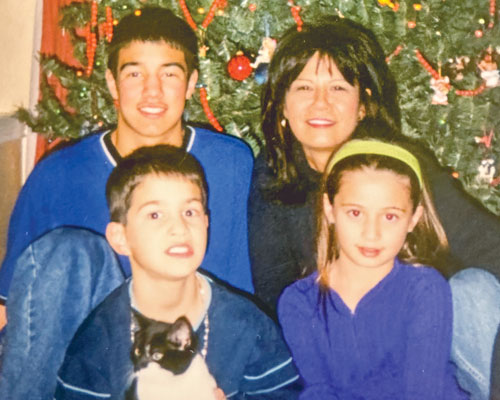
What transpired after?
Robbie: My mom had gifted me a subscription to the Living Buddhism and World Tribune, and I’d been bringing these wherever I went and reading them whenever I had a spare moment. At work, I’d begun talking about Buddhism with my friend and co-worker, telling him how it had changed the way I spoke to people and the way they spoke to me. In time, he came to a discussion meeting, and then another. We began to discuss what we’d read together and soon he expressed interest in receiving the Gohonzon. I’d not yet received my own and decided to embark on this journey with him, to receive the Gohonzon together.
Robin: As Robbie and his friend set off on their journey in faith, my dispute at work, which had lasted over a year, drew to a close. In September, my case was settled for 120 times the amount originally offered the previous year. I do think this left an impression on the kids, who saw me stand up for my own dignity without belittling in the least the dignity of those I was disputing.
The morning that Robbie and his friend each received the Gohonzon, in November of 2023, our family took up an entire row in the Detroit Buddhist Center’s main room. Robbie had reached out to friends and family, who’d all observed how much he’d changed over the course of the previous year, how driven he’d become and how thoughtful and caring. His sister, who he had a very difficult relationship with during their childhood, said recently of him, “There is no greater feeling than feeling proud of someone you love.”
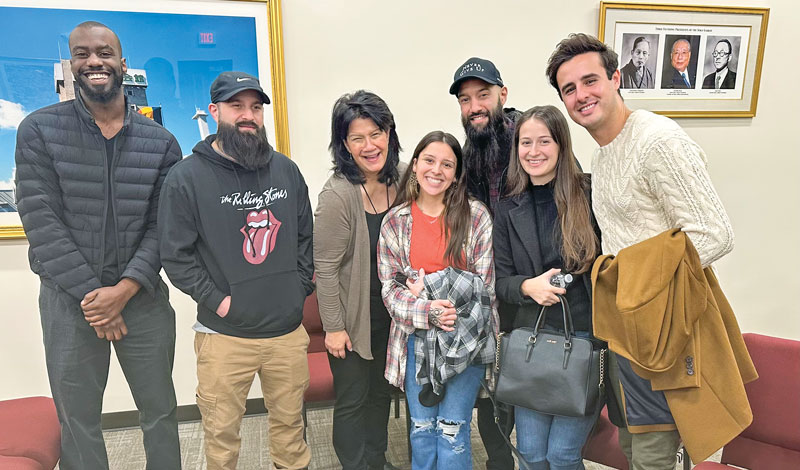
His girlfriend received the Gohonzon in September 2024 and just this past November, another friend did as well.
I think about how impressed and also, how exasperated, I was. And I think how right he was—he is not me. He has become who he has become—a wonderful person—because of the things he himself went through. All I did was open the door the moment he knocked.
You are reading {{ meterCount }} of {{ meterMax }} free premium articles

